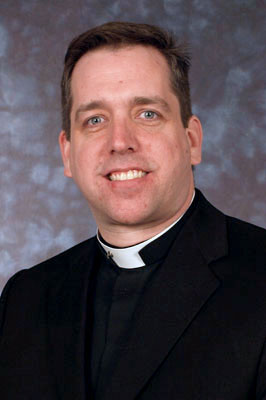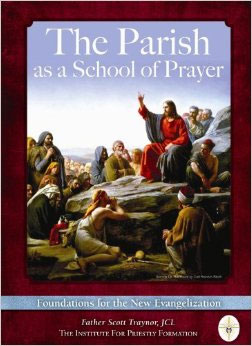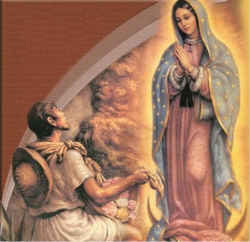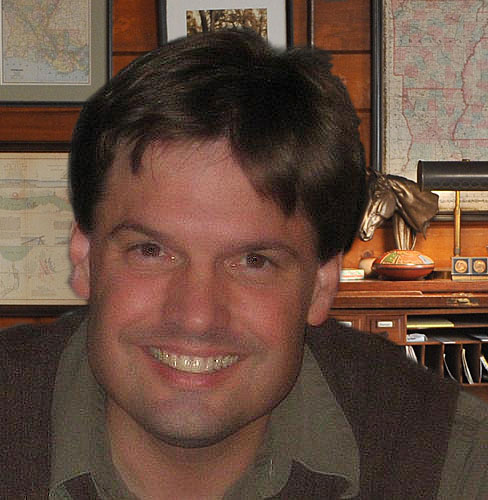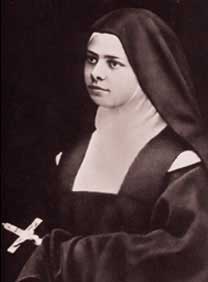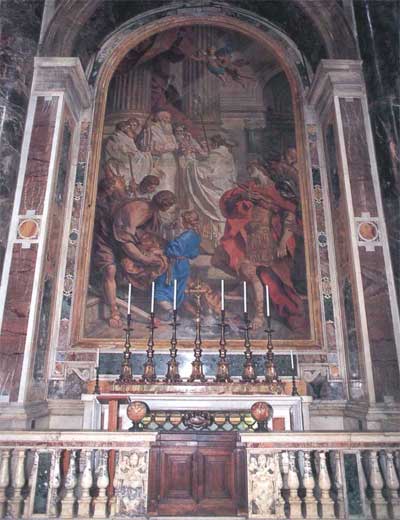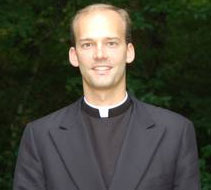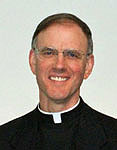SP#4 The School of Prayer: Foundations for the New Evangelization
Fr. Scott Traynor talks about the suffering of fear. Thoughts, feelings, and desires all come into play in our understanding of this topic. Wherever there is fear there dwells an experience of pain and wounding, which perfect love desires to heal. The love of God is the remedy and our prayer opens the door to healing and/or union with the One that loves perfectly. Our response in not trusting that love and areas of unforgiveness can be a block to that healing. How do we, in our united prayer with God, overcome this obstacle?
In Father Scott Traynor’s book, Blessed John Paul II’s memorable call to make of the parish a school of prayer takes on flesh and becomes concretely attainable. Those you read these faith-filled pages will find renewed desire to create such parishes and a clear road-map toward this goal.
–Father Timothy Gallagher, OMV
Father Scott Traynor received his STB from the Pontifical Gregorian University and his JCL from Catholic University of America. He has been an instructor and spiritual director for many of the programs at the Institute for Priestly Formation.
Father Traynor is a retreat master and spiritual director who has travelled the country as a speaker at various conferences, diocesan gatherings and national conferences.. He is especially sought after to present on the topics of prayer, discernment and priestly identity and mission.
He serves the Rector of the St. John Vianney Theological Seminary in Denver Colorado.
Tags: fear, love, prayer, Scott Traynor
This entry was posted on Wednesday, December 18th, 2013 at 1:19 am
You can follow any responses to this entry through the RSS 2.0 feed.
The Living Flame Of Love
 Songs of the soul in the intimate communication of loving union with God.
Songs of the soul in the intimate communication of loving union with God.
[powerpress]
1. O living flame of love
that tenderly wounds my soul
in its deepest center! Since
now you are not oppressive,
now consummate! if it be your will:
tear through the veil of this sweet encounter!
2. O sweet cautery,
O delightful wound!
O gentle hand! O delicate touch
that tastes of eternal life and pays every debt!
and pays every debt!
In killing you changed death to life.
3. O lamps of fire! in whose splendors
the deep caverns of feeling,
once obscure and blind,
now give forth, so rarely, so exquisitely,
both warmth and light to their Beloved.
4. How gently and lovingly
you wake in my heart,
where in secret you dwell alone;
and in your sweet breathing,
filled with good and glory,
how tenderly you swell my heart with love.
Here is a fine teaching from Fr. Barron:

My Soul is a Candle
My soul is a candle that burned away the veil;
only the glorious duties of light I now have.
The sufferings I knew initiated me into God.
I am a holy confessor for men.
When I see their tears running across their cheeks
and falling into
His hands,what can I say to their great sorrow
that I too haveknown.
The soul is a candle that will burn away the darkness,
only the glorious duties of love we will have.
The sufferings I knew initiated me into God.
only His glorious cares
I now have.
Tags: alone, darkness, heart, love, my soul is a candle, mystic, mystic of the Church, poems of john of the cross, songs of the soul, st. john of the cross, sufferings, the living flame of love
This entry was posted on Saturday, December 14th, 2013 at 12:33 am
You can follow any responses to this entry through the RSS 2.0 feed.
Prayer to Our Lady of Guadalupe
Dear Mother, we love you. We thank you for your promise to help us in our need. We trust in your love that dries our tears and comforts us. Teach us to find our peace in your Son, Jesus, and bless us every day of our lives.
Help us to build a shrine in our hearts. Make it as beautiful as the one built for you on the Mount of Tepeyac. A shrine full of trust, hope, and love of Jesus growing stronger each day.
Mary, you have chosen to remain with us by giving us your most wonderful and holy self-image on Juan Diego’s cloak. May we feel your loving presence as we look upon your face. Like Juan, give us the courage to bring your message of hope to everyone.
You are our Mother and our inspiration. Hear our prayers and answer us.
Amen.
Tags: Dear Mother, hope, Jesus, love, our lady of guadalupe, prayer
This entry was posted on Thursday, December 12th, 2013 at 6:12 am
You can follow any responses to this entry through the RSS 2.0 feed.
Heart of Hope Part 4 – 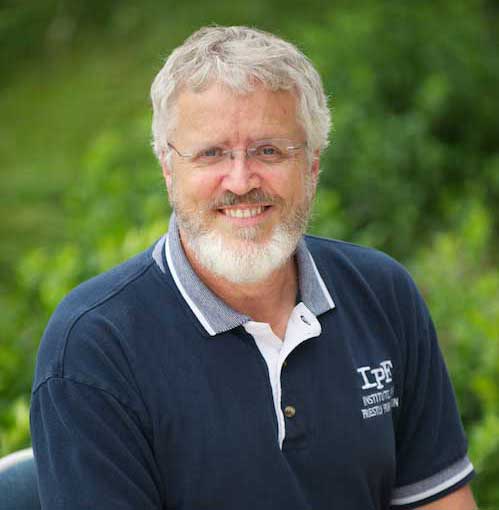  The healing hand of Christ, seeing the will of God, and how we suffer love. The tale of the two criminals on the cross next to Christ on Gologotha.
 The healing hand of Christ, seeing the will of God, and how we suffer love. The tale of the two criminals on the cross next to Christ on Gologotha.
[powerpress]
Deacon James Keating, PhD, the director of Theological Formation for the Institute for Priestly Formation, located at Creighton University, in Omaha, is making available to â€Discerning Hearts†and all who listen, his series of programs entitled “The Heart of Hopeâ€.
This extraordinarily popular series explores the work of suffering in the Christian life and how God can use it to transform the heart of the individual and the world.
Check out Deacon Keating’s “Discerning Hearts†page
The “Heart of Hope†tackles a very tough subject…the gift of suffering in the Christian life. Deacon Keating guides us well.
.
For more information on the “Institute of Priestly Formation†and for other material available by Deacon Keating, just click here
Don’t forget to pickup a copy of “Communion with Christ†, it is one of the best audio sets on prayer…ever!
Tags: Deacon Keating, love, suffering, the cross
This entry was posted on Tuesday, December 3rd, 2013 at 10:40 am
You can follow any responses to this entry through the RSS 2.0 feed.
USCCA7- Episode 7- The Good News: God Has Sent His Son
Archbishop Lucas offers insights on the US Catholic Catechism for Adults Chapter 7:
We ponder Christ’s person and his earthly words and deeds in terms of mystery. His earthly life reveals his hidden divine Sonship and plan for our salvation. His parables, miracles, sermons, and wisdom sayings help us “to see our God made visible, and so we are caught up in love of the God we cannot see” (First Preface for Christmas).
The Most Reverend George J. Lucas leads the Archdiocese of Omaha.
For other episodes in the visit our Archbishop George Lucas page
This programs is based on:
More information can be found here.
We wish to thank the USCCB for the permissions granted for use of relevant material used in this series.
Also we wish to thank Chuck Adams and Miriam Gutierrez for their vocal talents in this episode.
Tags: Archbishop Lucas, love, miracles, USCCB
This entry was posted on Monday, November 11th, 2013 at 11:47 am
You can follow any responses to this entry through the RSS 2.0 feed.
SP#2 The School of Prayer: Foundations for the New Evangelization
Fr. Scott Traynor talks about how we have to do more than just talk about prayer. He discusses how we must “live” our prayer in the union of love within the heart of the Holy Trinity. That is the goal of Christian prayer. He goes on to describe the very nature of the Holy Trinity….the relationship of love between the Father, the Son, and the Holy Spirit.
In Father Scott Traynor’s book, Blessed John Paul II’s memorable call to make of the parish a school of prayer takes on flesh and becomes concretely attainable. Those you read these faith-filled pages will find renewed desire to create such parishes and a clear road-map toward this goal.
–Father Timothy Gallagher, OMV
Father Scott Traynor received his STB from the Pontifical Gregorian University and his JCL from Catholic University of America. He has been an instructor and spiritual director for many of the programs at the Institute for Priestly Formation.
Father Traynor is a retreat master and spiritual director who has travelled the country as a speaker at various conferences, diocesan gatherings and national conferences.. He is especially sought after to present on the topics of prayer, discernment and priestly identity and mission.
He serves the Rector of the St. John Vianney Theological Seminary in Denver Colorado.
Tags: holy trinity, love, prayer, Scott Traynor
This entry was posted on Monday, November 11th, 2013 at 7:51 am
You can follow any responses to this entry through the RSS 2.0 feed.
As if Already in Eternity: The Wisdom of Blessed Elisabeth of the Trinity (as found on Anthony’s “Beginning to Pray” blog site)
Blessed Elisabeth of the Trinity is a witness to the primacy of contemplation in the life of the Church and the mystical wisdom contemplation releases into human history. Â This is the wisdom that understands how God is present in both the public square as well as in the intimacy of our hearts. Â Today, when the whole world needs this wisdom renewed, the Church celebrates her feast day and invites us to consider her powerful spiritual doctrine.
She wrote a famous prayer to the Holy Trinity that has helped many contemplatives recover devotion to the Divine Persons in their life of prayer.  This work is cited to support the  Catechism of the Catholic Church’s teaching on the Divine Works and the Trinitarian Missions.  The teaching itself is that God calls every individual to a great and beautiful purpose, to become a dwelling place for His presence in the world:
The ultimate end of the divine economy is the entry of God’s creatures into the perfect unity of the Blessed Trinity. Â But even now we are called to be a dwelling for the Most Holy Trinity, ‘If a man loves me,’ says the Lord, ‘he will keep my word, and my Father will love him, and we will come to him, and make our home with him’ (CCC 260).
This is a rich teaching because it says that our ultimate fulfillment is not simply something waiting for us in a remote future, in a distant afterlife. Â Instead, the Catechism proposes that heaven can begin now in faith. Â This means that our faith offers us a fullness of life. Â We do not have to be content with managing through life’s ambiguities and uncertainties with the hope that someday it might get better. Â Instead, our faith gives us a real foretaste of the fullness that awaits us — so that the excessiveness of God’s love can pour into our lives here and now, if we will believe in Him.
To encourage this decision to believe in the love that God has for us in the here and now of our lives, the Catechism cites the beginning of Blessed Elisabeth’s prayer to the Trinity, “O my God, Trinity whom I adore, help me to forget myself entirely so to establish myself in you, unmovable and peaceful as if my soul were already in eternity.”
Blessed Elisabeth’s prayer helps us consider what it means to have faith, to believe in God and what He calls us to become. Â This kind of faith is a matter of a love that takes us out of ourselves. It is, in this sense, an ecstatic movement of heart, a decision to lay aside everything so that there is space for God to dwell in us. Â Faith helps us see that our own bloated egos need to make way for God. Â To love Christ to the point of welcoming His word in our hearts means He can begin to help us forget our very self. Â He is the One who frees us so that the fullness of life that awaits us in heaven begins here on earth.
Her words suggest that the biggest obstacle to prayer is not anything outside ourselves, but proclivities within. Â The ego has its own specific gravity. Â Its force, if left unchecked, its deadly. Â Anxieties over our own plans and for security, our lust for control and to put others in their place, our need to be right and esteemed, our obsession with being liked or affirmed, our gluttony for comfort and entertainment; all of this fails to provide any firm ground for rectifying our existence. Â Unchecked, these tendencies suffocate the heart, and as long as one’s heart is pulled by these forces, it can find no peace.
Only when we can get out of ourselves are we able to breath the fresh air of friendship with God and true solidarity with one
another. Â At the same time, even after we see how imprisoned we are, left to our own resources, we cannot entirely free ourselves. Â The answer is not to be found in our own cleverness or in some Titanic effort to surmount oneself through techniques. Â Only Christ can help us leave our old way of life behind. Â This is why Blessed Elisabeth’s prayer begins with a cry for help.
Clinging to what Christ has revealed about the Father and about humanity, this is the essential movement of faith. Â This is His word to us – for He is the saving Word that reveals this inexhaustible mystery. Â Those whose hearts are vulnerable to this radiant beauty find true inner freedom.
Souls whom Christ helps to be free of themselves stand firm in love even as everything in life falls apart around them. Â This is only because through Christ they have found the ground of their very being in the excessive love flowing from the Holy Trinity into their nights, their voids, their inadequacies and even their failures. Â In short, come what come may they know they are loved and that love awaits them.
It by standing on this ground that a soul opens itself to God’s presence in ever new and surprising ways. Â On this ground, He dwells in them. Â With the inflow of His truth and love, it is easy to let go and to trust, and anyone who has discovered this freedom wants to be established there in an unmovable way.
Today is the feast of Blessed Elisabeth of the Trinity. Â She lived out this truth to her last anguished heartbeat, bedridden with an incurable disease even as the political powers of her day threatened those she loved the most and the Church was rocked by all kinds of scandal. Â This Carmelite Mystic, the Mystic of Dijon, believed her mission was to help souls enter to a transforming encounter with Christ, one that requires a journey out of ourselves where we are vulnerable enough to be touched by Him. Her words encourage us to call out to the Word, and to let His great Canticle of love resound in our hearts with all its fulness — for to know this saving truth is to live as if already in eternity.
Tags: Anthony Lilles, Blessed Elisabeth, faith, love
This entry was posted on Monday, November 11th, 2013 at 12:13 am
You can follow any responses to this entry through the RSS 2.0 feed.
Although she lived on for twenty-six years, Blessed Elizabeth of the Trinity had an extraordinary sense of the three persons of the Trinity dwelling within her.
John Murray PP tells her story:
They were almost contemporaries, both of whom followed the way of Carmel. While Thérese Martin gave the world her ‘little way’, Elizabeth Catez was truly the ‘prophet of the presence of God’. When Pope John Paul beatified her on 25 November 1984, he presented her to the Church as one ‘who led a life hidden with Christ in God’.
A terror or a saint!
However, Blessed Elizabeth of the Trinity, who was born in France in 1880, did not have such auspicious beginnings. ‘You will either be a terror or a saint,’ her mother had said. The stubborn little girl who often demanded her way, had inherited the military spirit of her ancestors. Her father Joseph had enlisted in the French army and had a successful military career, receiving even the Legion of Honour in 1881.
After the early death of her father, Elizabeth’s outbursts of anger increased. However once she experienced for the first time the sacrament of Penance, it brought about what she styled her ‘conversion’. She henceforth began to struggle noticeably against her violent temper.
In the spring of 1891, when she was almost eleven years old, Elizabeth made her First Communion. She was profoundly affected by her first reception of Christ in the sacrament of the Eucharist. Her mother later testified, ‘From that day and afterwards there were no more fits of anger’.
Trinity
Elizabeth asked for help in understanding her interior experience – her need for silence and recollection – and her sense of an inexplicable presence in the depth of her soul. The Dominicanproceeded to deepen her awareness of the truth of the indwelling of the Trinity in the soul of the baptized: that not just Christ, but that all three of the Trinity Father, Son, and Spirit – were present in love in her soul.
As she was waiting to enter her beloved Carmel, Elizabeth lived the life of a typical young, active Catholic laywoman of her time. She sang in two choirs in her parish; she helped prepare children for their First Communions, and she animated a type of ‘day care’ for the children of those who worked in the local factory.
The personality of this energetic young woman had blossomed from her earlier years. It should be noted that Elizabeth was also a very gifted musician who could have made a career with her talent. From the age of seven, she studied music at the Conservatory of Dijon, winning several prizes for her skill at the piano. ‘No one can interpret the great masters like Elizabeth,’ wrote one admirer.Home at last
At last Elizabeth entered the Carmel. There she was home. As a Carmelite she received the name of Sister Elizabeth of the Trinity and made her profession on the Feast of Epiphany, 1902. From reading St. Paul, her great scriptural mentor, Sister Elizabeth discovered her vocation. She would be a ‘Praise of Glory’ or Laudem Gloria praising God dwelling within her offering a ceaseless ‘Sanctus’.‘God dwells within you, do not leave Him so often,’ she advised. To another she wrote, ‘It is wonderful to recall that, except for the vision of seeing God, we possess God as all the Saints in Heaven do. We can surely be with Him always and no one can take us away from Him. He dwells in our souls!’ She often referred to the Blessed Trinity as ‘my Three’.
Secret for peace
As a child, Elizabeth had found the strength to conquer her fiery temper only after having received the body and blood of Christ in the Eucharist for the first time. As a Carmelite, she would read in Paul that it was Christ ‘who made peace through the blood of his Cross’ (Col.1,20), making ‘peace in my little heaven so that it may truly be the repose of the Three’.
Once she wrote to a friend, ‘I am going to give you my “secret”: think about this God who dwells within you, whose temple you are; St. Paul speaks in this way, and we can believe it.’
The call to praise the glory of God also included the call to share in the redemptive sufferings of Christ, to be able to say like St. Paul, ‘In my flesh I am filling up what is lacking in the afflictions of Christ on behalf of his body, which is the Church’ (Col 1,24) – and Sister Elizabeth had to accept suffering.
Addison’s disease
Early in 1906 it was noticed that Sister Elizabeth had become very weak. She made a retreat to prepare for the ‘Eternal Retreat’. The young Carmelite suffered for months from Addison’s Disease, a malady of the kidneys which at that time was incurable. As a result of this illness, Elizabeth suffered great fatigue, an inability to digest food, intense abdominal pains and great thirst.During the last week of her life, Sister Elizabeth’s stomach was very ulcerated, and yet she made frequent and lengthy visits to the Blessed Sacrament. On 31 October, she received the last rites. On 1 November, she made her confession and received Holy Communion for the last time. Elizabeth’s last audible words before her death were, ‘I am going to Light, to Love, to Life’.
Mission in heaven
She died on 9 November 1906, at the age of twenty-six, after having lived in Carmel for only five years. From her sick bed, Elizabeth wrote to a fellow Carmelite, ‘I think that in Heaven, my mission will be to draw souls by helping them go out of themselves to cling to God by a wholly simple and loving movement, and to keep them in this great silence within that will allow God to communicate Himself to them and transform them into Himself.’
This article first appeared in The Messenger (February 2007), a publication of the Irish Jesuits.
“Holy Trinity, Whom I Adore” a prayer of Blessed Elizabeth of the Trinity[powerpress url=”http://discerninghearts.com/Devotionals/Holy-Trinity-Whom-I-Adore.mp3″]Download (right click & choose “Save Link As”)
Holy Trinity, Whom I Adore
O my God, Trinity whom I adore, let me entirely forget myself that I may abide in You, still and peaceful as if my soul were already in eternity; let nothing disturb my peace nor separate me from You, O my unchanging God, but that each moment may take me further into the depths of Your mystery ! Pacify my soul! Make it Your heaven, Your beloved home and place of Your repose; let me never leave You there alone, but may I be ever attentive, ever alert in my faith, ever adoring and all given up to Your creative action.
O my beloved Christ, crucified for love, would that I might be for You a spouse of Your heart! I would anoint You with glory, I would love You – even unto death! Yet I sense my frailty and ask You to adorn me with Yourself; identify my soul with all the movements of Your soul, submerge me, overwhelm me, substitute Yourself in me that my life may become but a reflection of Your life. Come into me as Adorer, Redeemer and Saviour.
O Eternal Word, Word of my God, would that I might spend my life listening to You, would that I might be fully receptive to learn all from You; in all darkness, all loneliness, all weakness, may I ever keep my eyes fixed on You and abide under Your great light; O my Beloved Star, fascinate me so that I may never be able to leave Your radiance.
O Consuming Fire, Spirit of Love, descend into my soul and make all in me as an incarnation of the Word, that I may be to Him a super-added humanity wherein He renews His mystery; and You O Father, bestow Yourself and bend down to Your little creature, seeing in her only Your beloved Son in whom You are well pleased.
O my `Three’, my All, my Beatitude, infinite Solitude, Immensity in whom I lose myself, I give myself to You as a prey to be consumed; enclose Yourself in me that I may be absorbed in You so as to contemplate in Your light the abyss of Your Splendour !
Tags: Beloved Star, Blessed Elizabeth, blessed elizabeth of the trinity, carmelites, darkness, love
This entry was posted on Friday, November 8th, 2013 at 4:55 am
You can follow any responses to this entry through the RSS 2.0 feed.
THE WAY OF PERFECTION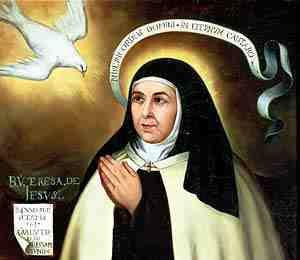
By
St. Teresa of Avila
Chapter 7
[powerpress]
For the pdf containing the complete text and footnotes click here
Treats of the same subject of spiritual love and gives certain counsels for gaining it.
For other audio chapters of
“The Way of Perfection”
THE WAY OF PERFECTION
by
ST. TERESA OF AVILA
Translated & Edited by
E. ALLISON PEERS
from the Critical Editon of
P. SILVERIO DE SANTA TERESA, C.D.
Tags: audio, Critical Editon, love, st, Way of Perfection
This entry was posted on Tuesday, November 5th, 2013 at 1:14 pm
You can follow any responses to this entry through the RSS 2.0 feed.
THE WAY OF PERFECTION
By
St. Teresa of Avila
Chapter 6
[powerpress]
For the pdf containing the complete text and footnotes click here
Returns to the subject of perfect love, already begun.
For other audio chapters of
“The Way of Perfection”
THE WAY OF PERFECTION
by
ST. TERESA OF AVILA
Translated & Edited by
E. ALLISON PEERS
from the Critical Editon of
P. SILVERIO DE SANTA TERESA, C.D.
Tags: audio, Critical Editon, love, Translated Edited
This entry was posted on Thursday, October 31st, 2013 at 3:11 am
You can follow any responses to this entry through the RSS 2.0 feed.
THE WAY OF PERFECTION
By
St. Teresa of Avila
Chapter 4 & Appendix
[powerpress]
For the pdf containing the complete text and footnotes click here
Exhorts the nuns to keep their Rule and names three things which are important for the spiritual life. Describes the first of these three things, which is love of one’s neighbour, and speaks of the harm which can be done by individual friendships
Appendix
For other audio chapters of
“The Way of Perfection”
THE WAY OF PERFECTION
by
ST. TERESA OF AVILA
Translated & Edited by
E. ALLISON PEERS
from the Critical Editon of
P. SILVERIO DE SANTA TERESA, C.D.
Tags: audio, Critical Editon, love, spiritual life, st, Way of Perfection
This entry was posted on Tuesday, October 29th, 2013 at 1:27 am
You can follow any responses to this entry through the RSS 2.0 feed.
Dr. Matthew Bunson discusses the life, times and teachings of  St. Basil the Great
[powerpress]
For more on St. Basil the Great and his teachings
With zeal and courage Basil opposed the heretics who denied that Jesus Christ was God as Father (cf. Basil, Letter 9, 3: PG 32, 272a; Letter 52, 1-3: PG 32, 392b-396a; Adv. Eunomium 1, 20:PG 29, 556c). Likewise, against those who would not accept the divinity of the Holy Spirit, he maintained that the Spirit is also God and “must be equated and
glorified with the Father and with the Son (cf. De Spiritu Sancto: SC 17ff., 348). For this reason Basil was one of the great Fathers who formulated the doctrine on the Trinity: the one God, precisely because he is love, is a God in three Persons who form the most profound unity that exists: divine unity.
In his love for Christ and for his Gospel, the great Cappadocian also strove to mend divisions within the Church (cf. Letters, 70, 243), doing his utmost to bring all to convert to Christ and to his word (cf. De Iudicio 4: PG 31, 660b-661a), a unifying force which all believers were bound to obey (cf.ibid. 1-3: PG 31, 653a-656c).
To conclude, Basil spent himself without reserve in faithful service to the Church and in the multiform exercise of the episcopal ministry. In accordance with the programme that he himself drafted, he became an “apostle and minister of Christ, steward of God’s mysteries, herald of the Kingdom, a model and rule of piety, an eye of the Body of the Church, a Pastor of Christ’s sheep, a loving doctor, father and nurse, a cooperator of God, a farmer of God, a builder of God’s temple” (cf. Moralia 80, 11-20: PG 31, 864b-868b).
This is the programme which the holy Bishop consigns to preachers of the Word – in the past as in the present -, a programme which he himself was generously committed to putting into practice. In 379 A.D. Basil, who was not yet 50, returned to God “in the hope of eternal life, through Jesus Christ Our Lord” (De Baptismo, 1, 2, 9).
He was a man who truly lived with his gaze fixed on Christ. He was a man of love for his neighbour. Full of the hope and joy of faith, Basil shows us how to be true Christians.
For more visit Vatican.va
Dr. Matthew Bunson, Senior Fellow of the St. Paul Center for Biblical Theology, is one of the United States’ leading authorities on the papacy and the Church.
His books include: The Encyclopedia of Catholic History; The Encyclopedia of Saints; Papal Wisdom; All Shall Be Well; Encyclopedia of the Roman Empire; and The Angelic Doctor: The Life and World of St. Thomas Aquinas; The Pope Encyclopedia; We Have a Pope! Benedict XVI, the first Catholic biography of the Holy Father in the English language; the Encyclopedia of U.S. Catholic History; Pope Francis. Â His also the editor of OSV’s “The Catholic Answer” magazine.
Tags: Church, love, matthew bunson, PG
This entry was posted on Friday, October 4th, 2013 at 5:40 pm
You can follow any responses to this entry through the RSS 2.0 feed.
 FG#10- Interior Freedom episode 10 – Fountains of Grace: reflections on contemporary spiritual classics with Donna Garrett
FG#10- Interior Freedom episode 10 – Fountains of Grace: reflections on contemporary spiritual classics with Donna Garrett
Join host Donna Garrett, with Fr. Daniel Brandenburg, LC, as they discuss the spiritual classic “Interior Freedom” by Fr.  Jacques Philippe  a priest of  Communaute des Beatitudes, an international association of the faithful of Pontifical Right founded in France in 1973.  The members of the Community, which has a contemplative vocation based on Carmelite spirituality, are actively engaged in the service of the poor and the proclamation of the Gospel.
[powerpress]
Discussed in this episode, among other topics,  from “Interior Freedom” page 125-126
“the trials or purifications so frequently referred to by the mystics are there to destroy whatever is artificial in our character, so that our true being may emerge- ie what we are tp God. The night of the soul could be called a series of impoverishments, sometimes violent ones that strip believers of all possibility of relying on themselves These trials are beneficial because they lead us to locate our identity where it truly belongs, The experience can be highly painful when someone who loves God goes through a phase without an atom of fervor even with a profound distaste for spiritual things. People do not lose their love for God, for their whole being remains completely oriented toward God; but they lose the feeling of love. The benefit of this trial is that it deprives us of any possibility of relying on the good we can do. God’s mercy is all.”
For other episodes in the this series click here “Fountains of Grace w/Donna Garrett”

You can find “Interior Freedom” here
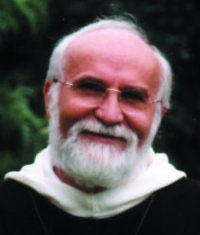
Fr. Jacques Philippe
Tags: Donna Garrett, Interior Freedom, love, reflections
This entry was posted on Wednesday, October 2nd, 2013 at 12:20 am
You can follow any responses to this entry through the RSS 2.0 feed.
Of Spiritual Consolation. I call it consolation when some interior movement in the soul is caused, through which the soul comes to be inflamed with love of its Creator and Lord; and when it can in consequence love no created thing on the face of the earth in itself, but in the Creator of them all.
Likewise, when it sheds tears that move to love of its Lord, whether out of sorrow for one’s sins, or for the Passion of Christ our Lord, or because of other things directly connected with His service and praise.
Finally, I call consolation every increase of hope, faith and charity, and all interior joy which calls and attracts to heavenly things and to the salvation of one’s soul, quieting it and giving it peace in its Creator and Lord.
[powerpress]
The Discernment of  Spirits: Setting the Captives Free – Serves as an introduction to the coming series and the Spiritual Exercises of St. Igantius of Loyola
Father Timothy M. Gallagher, O.M.V., was ordained in 1979 as a member of the Oblates of the Virgin Mary, a religious community dedicated to retreats and spiritual formation according to the Spiritual Exercises of St. Ignatius. Â Fr. Gallagher is featured on the EWTN series “Living the Discerning Life: Â The Spiritual Teachings of St. Ignatius of Loyola”.
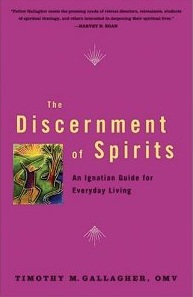 “The Discernment of Spirits: Setting the Captives Free” series is based on Fr. Gallagher’s book “Discern
“The Discernment of Spirits: Setting the Captives Free” series is based on Fr. Gallagher’s book “Discern ment of Spirits” published by Crossroads Books.
ment of Spirits” published by Crossroads Books.
.
For more information on the work of Fr. Timothy Gallagher check out his website
.
For the other episodes in this series check out Fr. Timothy Gallagher’s “Discerning Hearts†page
Tags: consolation, ewtn, joy, love
This entry was posted on Thursday, September 12th, 2013 at 11:12 am
You can follow any responses to this entry through the RSS 2.0 feed.
I leave it to Omar F. A. Gutierrez to write so well on the life,  times, and death of this great saint.
times, and death of this great saint.
You may perhaps remember a scene from Braveheart with Robert the Bruce and his father the leper.
When his son first brings him news about the rebellion led by William Wallace, a commoner, the father instantly devises a plan by which the Bruce clan can gain favor with the Scots and with the English. You get the feeling that Robert is a bit taken aback by the so easy and cold calculation of his rotted father.
He says,
This Wallace. He doesn’t even have a knighthood. But he fights with passion, and he is clever. He inspires men.
His father replies:
You admire him. Uncompromising men are easy to admire. He has courage. So does a dog. But you must understand this: Edward Longshanks is the most ruthless king ever to sit on the throne of England, and none of us, and nothing of Scotland, will survive unless we are as ruthless, more ruthless, than he.
“Uncompromising men are easy to admire.†There is in this world, and it seems more so today, a habit of admiring the compromising fellow. With the ubiquitous dictatorship of relativism that oppresses so many minds, it only makes sense that the general public would take offense at anyone who dares stand up for something with uncompromising stolidity.
The holder of objective truth claims is – so the sages of Manhattan and Melrose Place tell us – no different than the Nazi who insists on the claim to racial purity or the Islamic bomber who literally does cling to his religion and guns.
For this reason, the figure of St. Thomas More, whose feast it is today, can be such a 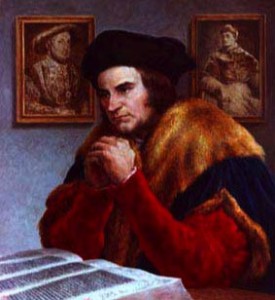 perplexing figure for the modern mind. And even the Catholic who consumes their breakfast whilst pouring over the latest moto proprio can miss this astonishingly great man. I have to admit having skipped over him in my studies, chalking him up with all the other saints and blesseds who gain God’s favor by losing their heads. But St. Thomas More is more than just a martyr.
perplexing figure for the modern mind. And even the Catholic who consumes their breakfast whilst pouring over the latest moto proprio can miss this astonishingly great man. I have to admit having skipped over him in my studies, chalking him up with all the other saints and blesseds who gain God’s favor by losing their heads. But St. Thomas More is more than just a martyr.
He’s an example of such exquisite lack of compromise that he can teach us a great deal about the Catholic Social Doctrine we long to understand and live out. (more…)
Tags: children, england, english reformation, love, martyr, martyrdom, protestant reformation, tudors
This entry was posted on Saturday, June 22nd, 2013 at 6:32 am
You can follow any responses to this entry through the RSS 2.0 feed.

